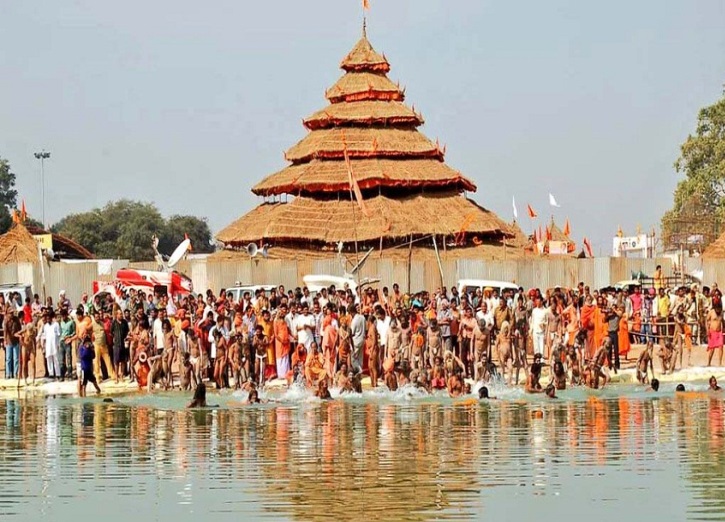


Shankaracharya Avimukteshwaranand Saraswati has demanded that the cow be declared the "National Mother," and cow slaughter be made a punishable crime. He also called for the reservation of the Kumbh Mela exclusively for Hindus, and announced plans for a grand yagna during the event. The Hindu saint also appointed representatives to oversee cow protection in each state and called on Hindus to uphold their faith and the significance of cow protection.
Cow Protection and Hindu Nationalism in India
The recent demand by Shankaracharya Avimukteshwaranand Saraswati to declare the cow as the "National Mother" and make cow slaughter a punishable crime has sparked a debate on the role of religion and nationalism in Indian society.
Origins of Cow Protection
Cow protection has long been an integral part of Hinduism, with the cow considered a sacred animal associated with the Earth Mother and the goddess Kamadhenu. The Rigveda, an ancient Hindu text, refers to the cow as "Aditi, the mother of the gods."
British Colonialism and Cow Protection
During the British colonial period, cow protection became a rallying point for Hindu nationalists. Cow slaughter was prohibited in several princely states, and the Indian National Congress incorporated cow protection into its platform.
Post-Independence India
After India's independence in 1947, cow protection continued to be a contentious issue. The Indian constitution prohibits the slaughter of milch and draught cattle, but several states have passed laws banning cow slaughter altogether.
Rise of Hindu Nationalism
In recent years, cow protection has become a key plank of Hindu nationalist ideology. Organizations such as the Rashtriya Swayamsevak Sangh (RSS) have campaigned for stricter laws against cow slaughter and the promotion of cow-based products.
Current Developments
Saraswati's demand for a National Cow Protection Law and the reservation of the Kumbh Mela for Hindus are part of a broader effort by Hindu nationalists to reclaim India's Hindu heritage. These demands have been met with both support and opposition, reflecting the complex relationship between religion, nationalism, and secularism in Indian society.
Top 5 FAQs
1. Why is cow protection important to Hindus? Cow protection is part of Hindu religious beliefs and is associated with the Earth Mother and the goddess Kamadhenu.
2. What is the current law on cow slaughter in India? The Indian constitution prohibits the slaughter of milch and draught cattle, but several states have passed laws banning cow slaughter altogether.
3. What is the role of the RSS in cow protection? The RSS is a Hindu nationalist organization that has campaigned for stricter laws against cow slaughter and the promotion of cow-based products.
4. What is the Kumbh Mela and why is it important? The Kumbh Mela is a Hindu pilgrimage that occurs every 12 years. It is one of the largest religious gatherings in the world.
5. What is the significance of Saraswati's recent demands? Saraswati's demands reflect the growing influence of Hindu nationalism in India and the attempt to reclaim India's Hindu heritage.

Zohran Mamdani's victory in the New York City mayoral race caused a wave of anti-immigrant and racist sentiments from supporters of US President Donald Trump's "Make America Great Again" movement. Prominent right-wing social media accounts equated Mamdani's win with bringing "third world politicians" into New York City and called for his deportation. The 34-year-old Democratic socialist and first Muslim mayor of New York also faced criticism and false accusations, including being labeled a "Hamas supporter" by an Israeli minister. Despite this, Mamdani celebrated his win and thanked voters for their overwhelming support.

Rahul Gandhi, the Leader of Opposition, has accused the BJP and the Election Commission of manipulating the 2024 assembly election results in Haryana. He presented evidence that a photo of a Brazilian model was used 22 times in the voter rolls of a constituency, under different names. The model has been identified as Matheus Ferrero, a photographer based in Brazil, and her image has been downloaded over 400,000 times, making it likely that the fake voter entries were made using her picture.

Congress leader Rahul Gandhi accused the BJP and Election Commission of manipulating voter rolls in Haryana during the 2024 assembly elections, claiming that 25 lakh votes were "stolen". Haryana CM Nayab Singh Saini and former CM Bhupinder Singh Hooda both responded to Gandhi's allegations, with Saini accusing him of lying and Hooda supporting the claims. Gandhi dropped the "H Bomb" during his press conference, saying that one in eight voters in Haryana is fake.

Zohran Mamdani's victory in the New York mayoral race has caused a rift within the Democratic Party as he challenges not only Republicans but also members of his own party. In his victory speech, Mamdani called out President Trump and criticized the leadership of the Democratic party for not being bold enough. This could lead to a shift towards more progressive and socialist policies within the party, according to analysts.

Zohran Mamdani, a 34-year-old Democrat, pulled off a historic victory in New York City's mayoral race, becoming the city's first Muslim mayor and youngest leader in more than a century. Mamdani's progressive policies and direct response to President Trump's threats resonated with voters, securing a win over independent and Republican candidates. The Democrats also dominated in other key elections, highlighting a shift towards their party's policies. However, as Mamdani's term begins, all eyes will be on his performance and the challenges he will face as the new leader of one of the largest cities in the US.

Congress leader Rahul Gandhi shared a video of BJP leader B Gopalakrishnan from Kerala alleging that nearly 25 lakh votes were stolen in Haryana. Gopalakrishnan claimed that individuals were brought from outside to vote in constituencies the party aimed to win, and that this was a common practice. Gandhi described this as a fundamental attack on India's democracy and its democratic ideals of Mahatma Gandhi, BR Ambedkar, Jawaharlal Nehru, Sardar Patel, and Subhas Chandra Bose. He stated that the responsibility of ensuring the integrity of voter lists lies with the Election Commission, not political parties.

Zohran Mamdani, at the young age of 34, has become the first Muslim mayor of New York City and the youngest person in over a century to lead the largest city in the US. In his victory speech, Mamdani addresses not only his plans for the city, but also directly calls out Donald Trump and his divisive actions. Trump, who had threatened to cut federal funding for the city if Mamdani won, writes a cryptic message on social media. Democrats also make gains in other major elections, cementing their hold on various positions of power.

Rahul Gandhi, Leader of Opposition in Lok Sabha, has made explosive allegations of unprecedented vote fraud in the 2024 Haryana assembly elections. He claims that approximately 25 lakh votes were "stolen" in a state that has two crore voters. Gandhi, who has been vocal about suspicions of election tampering, presented evidence including a video of Haryana Chief Minister Nayab Singh Saini claiming that "arrangements" had been made for his party to win the polls. However, the Election Commission has hit back, stating that zero appeals were filed against the electoral rolls in Haryana and questioning the actions of Congress polling agents. The BJP, in turn, has accused the Congress of trying to deflect attention from their own failure.

During his victory speech, newly elected mayor Zohran Mamdani called out US President Donald Trump's immigration policies and vowed to protect the city of immigrants. Mamdani also promised to combat corruption and stand up for the marginalized communities, while indirectly challenging Trump to turn up the volume and listen to the will of the people.

Zohran Mamdani, son of filmmaker Mira Nair, made history by becoming the first Democratic Party progressive to be elected as mayor of New York City. He left social media abuzz with his emotional speech that ended with YRF's iconic Dhoom tune, marking not only a new beginning for the city but also a nod to his Indian roots. But as he takes on his new role, Mamdani faces the daunting task of delivering on his ambitious campaign promises, which have been deemed unrealistic by critics. Nonetheless, his victory brings hope and a message of empowerment for the citizens of New York.